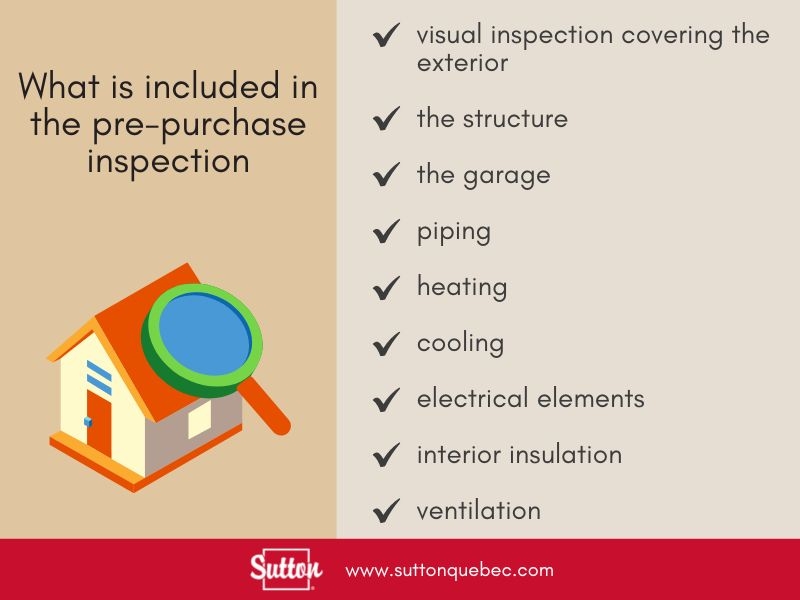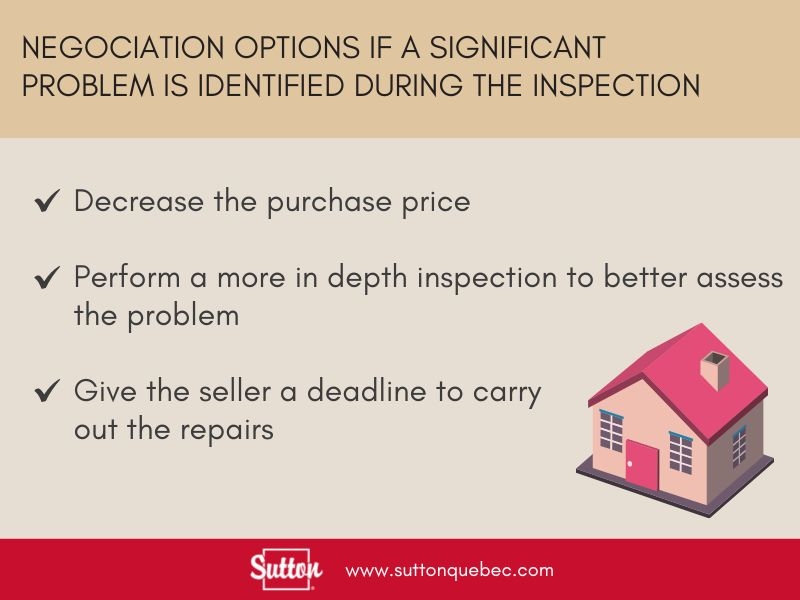Protect yourself with a pre-purchase home inspection
Although not required for obtaining a mortgage, pre-purchase inspection is strongly recommended. Whether it is for a new or used house, a town house or a chalet in the region, a condo or a bungalow, having a building inspection of the property to be purchased can save you a lot of hassle and unpleasant surprises. Indeed, buying a home without an inspection exposes you to potential unforseen events that you want to avoid for one of the biggest purchase of your life.
SUMMARY
What is a pre-purchase inspection?
The costs of an inspection
Choosing your home inspector carefully
Your options after the inspection
3 reasons why have your home inspected before buying
What is a pre-purchase inspection?
A home inspection is an assessment of the interior and exterior of a property to give the buyer a better understanding of the condition of the building. The inspector assesses the structure, walls, ceiling, floor, foundations, roof, etc. In the case of a condominium, it is also possible to inspect common areas.

Your real estate broker will attend the inspection in order to be able to advise you properly on what will be observed. You should also attend so that you can see for yourself the condition of the property and get a good understanding of it. You will then have the opportunity to ask your questions and get answers directly.
The costs of an inspection
There are several things that affect the price of a home inspector. The costs depend on the size of the house, the inspection services requested, the region, etc. A property inspection can cost as little as $ 200 and go as high as $ 1,000 depending on these elements. It is therefore an amount to consider in the costs associated with the purchase of a property.
Choose your home inspector carefully
Selecting a building inspector is not a step to be overlooked. The goal is to find an inspector who you can trust but also who will be available on time. Your real estate broker also has his address book with a list of trusted inspectors that he can refer to you. Also, be sure to ask the right questions for the building inspectors you contact in order to make your choice.
Your options after the inspection
Following the inspection, the inspector provides a report which contains detailed observations on the condition of the house as well as details of the defects. The report will also mention the work that will need to be done and will include photos of the place.
It is then up to you to assess whether what has been noted influences your decision to buy the property or the terms of sale, for example. After the inspection, you have several options.
- If nothing major calls into question your choice, no change is made to the transaction.
- If larger issues have been identified you may want to renegotiate the price or terms of the purchase.

- Another option is to cancel the sale. To be able to cancel the transaction, you must have added to the promise to purchase a purchase clause conditional on the inspection in the event that the latter is not favorable.
Whatever the scenario, your real estate broker will advise you and explain what is available to you and how to proceed. You can also find information about the pre-purchase inspection on the website of the Organisme d'autoréglementation du courtageimmobilier du Québec (OACIQ). It ensures the protection of members of the public who enlist the services of real estate brokerage professionals governed by the Real Estate Brokerage Act.
3 reasons why have your home inspected before buying
In summary, here are some concrete reasons why it is essential to do a pre-purchase inspection.
1. Understand the strengths and weaknesses of your future property and avoid unpleasant surprises
Buying a property is a big transaction that represents a considerable amount of money. It is therefore essential to do this while being aware of the condition of the property. Buying a house with full knowledge of the facts helps avoid sometimes huge surprises. After you've been charmed by its neighborhood, look, size, kitchen, etc., you might as well know its flaws before making a long-term commitment to your property.
2. Have an idea of potential work to be done in the short, medium and long term and negotiate the price
Sometimes the inspection identifies work to be scheduled that was not mentioned by the seller. Knowing what work is to be expected when you take possession or in 5 or 10 years allows you to plan your budget and your time accordingly. As mentioned above, in the event of major issues where significant repairs will have to be done, you can also negotiate the price or the terms of purchase.
3. To be able to cancel the purchase if the inspection is not favorable
Likewise, since an inspection can reveal major issues that you wouldn't have known otherwise, you give yourself the option of canceling the purchase instead of finding yourself with a greater financial burden than you anticipated.
Basically, a pre-purchase inspection allows you to enter your new home with peace of mind. This step should not be neglected, even in a context where you must position yourself quickly on your purchase.
Talk to your real estate broker who will be able to advise you and recommend trustworthy building inspectors.


